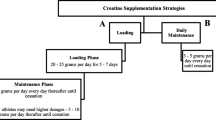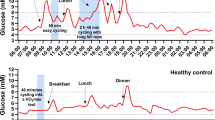Abstract
Purpose
The ergogenic effect of caffeine on exercise of maximum intensity has been well established. However, there is controversy regarding the effect of caffeine on shifting substrate oxidation at submaximal exercise. The aim of this study was to investigate the effect of acute caffeine ingestion on whole-body substrate oxidation during 1 h of cycling at the intensity that elicits maximal fat oxidation (Fatmax).
Methods
In a double-blind, randomized, and counterbalanced experiment, 12 healthy participants (VO2max = 50.7 ± 12.1 mL/kg/min) performed two acute experimental trials after ingesting either caffeine (3 mg/kg) or a placebo (cellulose). The trials consisted of 1 h of continuous cycling at Fatmax. Energy expenditure, fat oxidation rate, and carbohydrate oxidation rate were continuously measured by indirect calorimetry.
Results
In comparison to the placebo, caffeine increased the amount of fat oxidized during the trial (19.4 ± 7.7 vs 24.7 ± 9.6 g, respectively; P = 0.04) and decreased the amount of carbohydrate oxidized (94.6 ± 30.9 vs 73.8 ± 32.4 g; P = 0.01) and the mean self-perception of fatigue (Borg scale = 11 ± 2 vs 10 ± 2 arbitrary units; P = 0.05). In contrast, caffeine did not modify total energy expenditure (placebo = 543 ± 175; caffeine = 559 ± 170 kcal; P = 0.60) or mean heart rate (125 ± 13 and 127 ± 9 beats/min; P = 0.30) during exercise. Before exercise, caffeine increased systolic and diastolic blood pressure whilst it increased the feelings of nervousness and vigour after exercise (P < 0.05).
Conclusion
These results suggest that a moderate dose of caffeine (3 mg/kg) increases the amount of fat oxidized during 1 h of cycling at Fatmax. Thus, caffeine might be used as an effective strategy to enhance body fat utilization during submaximal exercise. The occurrence of several side effects should be taken into account when using caffeine to reduce body fat in populations with hypertension or high sensitivity to caffeine.


Similar content being viewed by others
References
Goldstein ER, Ziegenfuss T, Kalman D et al (2010) International society of sports nutrition position stand: Caffeine and performance. J Int Soc Sports Nutr 7:5
Salinero J, Lara B, Del Coso J (2019) Effects of acute ingestion of caffeine on team sports performance: a systematic review and meta-analysis. Res Sport Med 27:238–256. https://doi.org/10.1080/15438627.2018.1552146
Grgic J, Grgic I, Pickering C et al (2019) Wake up and smell the coffee: Caffeine supplementation and exercise performance - An umbrella review of 21 published meta-analyses. Br J Sports Med 54:681–688. https://doi.org/10.1136/bjsports-2018-100278
Maughan RJ, Burke LM, Dvorak J et al (2018) IOC consensus statement: dietary supplements and the high-performance athlete. Br J Sports Med 52:439–455. https://doi.org/10.1136/bjsports-2018-099027
Fredholm BB, Yang J, Wang Y (2017) Low, but not high, dose caffeine is a readily available probe for adenosine actions. Mol Aspects Med 55:20–25
Graham TE (2001) Caffeine and exercise metabolism, endurance and performance. Sport Med 31:785–807
Davis JK, Green JM (2009) Caffeine and anaerobic performance: Ergogenic value and mechanisms of action. Sport Med 39:813–832
Ruíz-Moreno C, Lara B, Brito de Souza D et al (2020) Acute caffeine intake increases muscle oxygen saturation during a maximal incremental exercise test. Br J Clin Pharmacol 86:861–867. https://doi.org/10.1111/bcp.14189
Gutiérrez-Hellín J, Del Coso J (2018) Effects of p-Synephrine and caffeine ingestion on substrate oxidation during exercise. Med Sci Sport Exerc 50:1899–1906. https://doi.org/10.1249/MSS.0000000000001653
Costill DL, Dalsky GP, Fink WJ (1978) Effects of caffeine ingestion on metabolism and exercise performance. Med Sci Sports 10:155–158
Venables MC, Achten J, Jeukendrup AE (2005) Determinants of fat oxidation during exercise in healthy men and women: A cross-sectional study. J Appl Physiol. https://doi.org/10.1152/japplphysiol.00662.2003
Graham TE, Helge JW, MacLean DA et al (2000) Caffeine ingestion does not alter carbohydrate or fat metabolism in human skeletal muscle during exercise. J Physiol 529:837–847. https://doi.org/10.1111/j.1469-7793.2000.00837.x
Graham TE, Battram DS, Dela F et al (2008) Does caffeine alter muscle carbohydrate and fat metabolism during exercise? Appl Physiol Nutr Metab Physiol Appl Nutr Metab 33:1311–1318. https://doi.org/10.1139/H08-129
Graham TE, Spriet LL (1995) Metabolic, catecholamine, and exercise performance responses to various doses of caffeine. J Appl Physiol 78:867–874. https://doi.org/10.1152/jappl.1995.78.3.867
Beaumont RE, James LJ (2017) Effect of a moderate caffeine dose on endurance cycle performance and thermoregulation during prolonged exercise in the heat. J Sci Med Sport 20:1024–1028. https://doi.org/10.1016/j.jsams.2017.03.017
Hodgson AB, Randell RK, Jeukendrup AE (2013) The metabolic and performance effects of caffeine compared to coffee during endurance exercise. PLoS ONE 8:e59561. https://doi.org/10.1371/journal.pone.0059561
Anderson DE, Hickey MS (1994) Effects of caffeine on the metabolic and catecholamine responses to exercise in 5 and 28 degrees C. Med Sci Sports Exerc 26:453–458
Ryu S, Choi SK, Joung SS et al (2001) Caffeine as a lipolytic food component increases endurance performance in rats and athletes. J Nutr Sci Vitaminol (Tokyo) 47:139–146. https://doi.org/10.3177/jnsv.47.139
Donelly K, McNaughton L (1992) The effects of two levels of caffeine ingestion on excess postexercise oxygen consumption in untrained women. Eur J Appl Physiol Occup Physiol 65:459–463. https://doi.org/10.1007/BF00243514
Schubert MM, Sabapathy S, Leveritt M, Desbrow B (2014) Acute exercise and hormones related to appetite regulation: a meta-analysis. Sports Med 44:387–403. https://doi.org/10.1007/s40279-013-0120-3
Alkhatib A, Seijo M, Larumbe E, Naclerio F (2015) Acute effectiveness of a “fat-loss” product on substrate utilization, perception of hunger, mood state and rate of perceived exertion at rest and during exercise. J Int Soc Sports Nutr 12:44. https://doi.org/10.1186/s12970-015-0105-8
Cruz R, de Aguiar R, Turnes T et al (2015) Caffeine affects time to exhaustion and substrate oxidation during cycling at maximal lactate steady state. Nutrients 7:5254–5264. https://doi.org/10.3390/nu7075219
Maunder E, Plews DJ, Kilding AE (2018) Contextualising maximal fat oxidation during exercise: Determinants and normative values. Front Physiol 23:599. https://doi.org/10.3389/fphys.2018.00599
Gutiérrez-Hellín J, Ruiz-Moreno C, Del Coso J (2019) Acute p-synephrine ingestion increases whole-body fat oxidation during 1-h of cycling at Fatmax. Eur J Nutr. https://doi.org/10.1007/s00394-019-02101-6
Filip A, Wilk M, Krzysztofik M, Del Coso J (2020) Inconsistency in the ergogenic effect of caffeine in athletes who regularly consume caffeine: Is it due to the disparity in the criteria that defines habitual caffeine intake? Nutrients. https://doi.org/10.3390/nu12041087
Frandsen J, Pistoljevic N, Quesada JP et al (2020) Menstrual cycle phase does not affect whole body peak fat oxidation rate during a graded exercise test. J Appl Physiol 128:681–687. https://doi.org/10.1152/japplphysiol.00774.2019
Horton TJ, Miller EK, Glueck D, Tench K (2002) No effect of menstrual cycle phase on glucose kinetics and fuel oxidation during moderate-intensity exercise. Am J Physiol - Endocrinol Metab. https://doi.org/10.1152/ajpendo.00238.2001
Lara B, Gutiérrez-Hellín J, García-Bataller A et al (2019) Ergogenic effects of caffeine on peak aerobic cycling power during the menstrual cycle. Eur J Nutr. https://doi.org/10.1007/s00394-019-02100-7
Lara B, Gutiérrez Hellín J, Ruíz-Moreno C et al (2019) Acute caffeine intake increases performance in the 15-s Wingate test during the menstrual cycle. Br J Clin Pharmacol. https://doi.org/10.1111/bcp.14175
Burke LM, Hawley JA, Wong SHS, Jeukendrup AE (2011) Carbohydrates for training and competition. J Sports Sci 29:S17–S27. https://doi.org/10.1080/02640414.2011.585473
Sawka MN, Burke LM, Eichner ER et al (2007) Exercise and fluid replacement. Med Sci Sports Exerc 39:377–390
Brouwer E (1957) On simple formulae for calculating the heat expenditure and the quantities of carbohydrate and fat oxidized in metabolism of men and animals, from gaseous exchange (Oxygen intake and carbonic acid output) and urine-N. Acta Physiol Pharmacol Neerl 6:795–802
Borg GAV (1954) Psychophysical bases of perceived exertion. Plast Reconstr Surg 14:377–381. https://doi.org/10.1249/00005768-198205000-00012
Salinero JJ, Lara B, Abian-Vicen J et al (2014) The use of energy drinks in sport: Perceived ergogenicity and side effects in male and female athletes. Br J Nutr 112:1494–1502. https://doi.org/10.1017/S0007114514002189
Lara B, Ruiz-Vicente D, Areces F et al (2015) Acute consumption of a caffeinated energy drink enhances aspects of performance in sprint swimmers. Br J Nutr 114:908–914. https://doi.org/10.1017/S0007114515002573
Hopkins WG, Marshall SW, Batterham AM, Hanin J (2009) Progressive statistics for studies in sports medicine and exercise science. Med Sci Sports Exerc 41:3–13. https://doi.org/10.1249/MSS.0b013e31818cb278
Hopkins WG (2020) A Spreadsheet for deriving a confidence interval, mechanistic inference and clinical inference from a p value. https://www.sportsci.org/2007/wghinf.htm. Accessed 20 Jun 2020
McCall AL, Millington WR, Wurtman RJ (1982) Blood-brain barrier transport of caffeine: Dose-related restriction of adenine transport. Life Sci 31:2709–2715. https://doi.org/10.1016/0024-3205(82)90715-9
Purdom T, Kravitz L, Dokladny K, Mermier C (2018) Understanding the factors that effect maximal fat oxidation. J Int Soc Sports Nutr 15:3. https://doi.org/10.1186/s12970-018-0207-1
Randell RK, Rollo I, Roberts TJ et al (2017) Maximal fat oxidation rates in an athletic population. Med Sci Sports Exerc 49:133–140. https://doi.org/10.1249/MSS.0000000000001084
Daly J, Shi D (1994) The role of adenosine receptors in the central action of caffeine. Pharmacopsychoecologia 7:201–213. https://doi.org/10.1201/9781439822470.ch1
Killen LG, Green JM, O’Neal EK et al (2013) Effects of caffeine on session ratings of perceived exertion. Eur J Appl Physiol 113:721–727. https://doi.org/10.1007/s00421-012-2480-z
Doherty M, Smith PM (2005) Effects of caffeine ingestion on rating of perceived exertion during and after exercise: a meta-analysis. Scand J Med Sci Sports 15:69–78. https://doi.org/10.1111/j.1600-0838.2005.00445.x
Ruiz-Moreno C, Lara B, Salinero JJ et al (2020) Time course of tolerance to adverse effects associated with the ingestion of a moderate dose of caffeine. Eur J Nutr. https://doi.org/10.1007/s00394-019-02167-2
Lara B, Gonzalez-Millán C, Salinero JJ et al (2014) Caffeine-containing energy drink improves physical performance in female soccer players. Amino Acids 46:1385–1392. https://doi.org/10.1007/s00726-014-1709-z
Lara B, Ruiz-Moreno C, Salinero JJ, Del Coso J (2019) Time course of tolerance to the performance benefits of caffeine. PLoS ONE 14:e0210275. https://doi.org/10.1371/journal.pone.0210275
Acknowledgements
The authors wish to thank the subjects for their invaluable contribution to the study.
Funding
This investigation did not receive any funding.
Author information
Authors and Affiliations
Corresponding author
Ethics declarations
Conflict of interest
The authors declare no support from any organization for the submitted work; no financial relationships with any organizations that might have an interest in the submitted work in the previous 3 years; and no other relationships or activities that could appear to have influenced the submitted work.
Rights and permissions
About this article
Cite this article
Ruiz-Moreno, C., Gutiérrez-Hellín, J., Amaro-Gahete, F.J. et al. Caffeine increases whole-body fat oxidation during 1 h of cycling at Fatmax. Eur J Nutr 60, 2077–2085 (2021). https://doi.org/10.1007/s00394-020-02393-z
Received:
Accepted:
Published:
Issue Date:
DOI: https://doi.org/10.1007/s00394-020-02393-z




